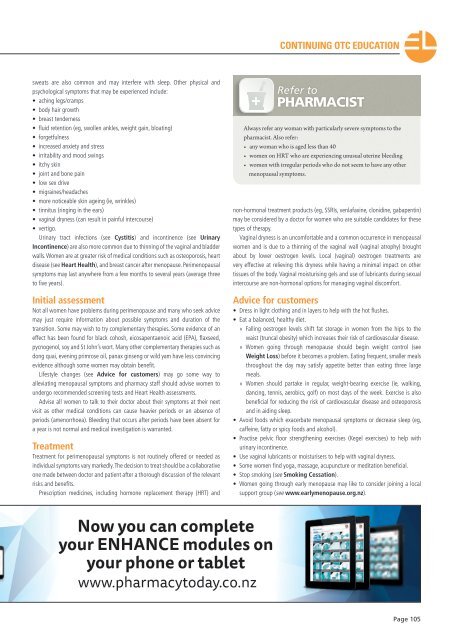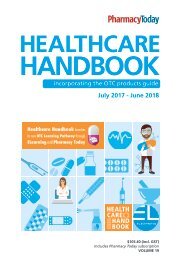2017 HCHB_digital
Create successful ePaper yourself
Turn your PDF publications into a flip-book with our unique Google optimized e-Paper software.
CONTINUING OTC EDUCATION<br />
sweats are also common and may interfere with sleep. Other physical and<br />
psychological symptoms that may be experienced include:<br />
• aching legs/cramps<br />
• body hair growth<br />
• breast tenderness<br />
• fluid retention (eg, swollen ankles, weight gain, bloating)<br />
• forgetfulness<br />
• increased anxiety and stress<br />
• irritability and mood swings<br />
• itchy skin<br />
• joint and bone pain<br />
• low sex drive<br />
• migraines/headaches<br />
• more noticeable skin ageing (ie, wrinkles)<br />
• tinnitus (ringing in the ears)<br />
• vaginal dryness (can result in painful intercourse)<br />
• vertigo.<br />
Urinary tract infections (see Cystitis) and incontinence (see Urinary<br />
Incontinence) are also more common due to thinning of the vaginal and bladder<br />
walls. Women are at greater risk of medical conditions such as osteoporosis, heart<br />
disease (see Heart Health), and breast cancer after menopause. Perimenopausal<br />
symptoms may last anywhere from a few months to several years (average three<br />
to five years).<br />
Initial assessment<br />
Not all women have problems during perimenopause and many who seek advice<br />
may just require information about possible symptoms and duration of the<br />
transition. Some may wish to try complementary therapies. Some evidence of an<br />
effect has been found for black cohosh, eicosapentaenoic acid (EPA), flaxseed,<br />
pycnogenol, soy and St John’s wort. Many other complementary therapies such as<br />
dong quai, evening primrose oil, panax ginseng or wild yam have less convincing<br />
evidence although some women may obtain benefit.<br />
Lifestyle changes (see Advice for customers) may go some way to<br />
alleviating menopausal symptoms and pharmacy staff should advise women to<br />
undergo recommended screening tests and Heart Health assessments.<br />
Advise all women to talk to their doctor about their symptoms at their next<br />
visit as other medical conditions can cause heavier periods or an absence of<br />
periods (amenorrhoea). Bleeding that occurs after periods have been absent for<br />
a year is not normal and medical investigation is warranted.<br />
Treatment<br />
Treatment for perimenopausal symptoms is not routinely offered or needed as<br />
individual symptoms vary markedly. The decision to treat should be a collaborative<br />
one made between doctor and patient after a thorough discussion of the relevant<br />
risks and benefits.<br />
Prescription medicines, including hormone replacement therapy (HRT) and<br />
Refer to<br />
PHARMACIST<br />
Always refer any woman with particularly severe symptoms to the<br />
pharmacist. Also refer:<br />
• any woman who is aged less than 40<br />
• women on HRT who are experiencing unusual uterine bleeding<br />
• women with irregular periods who do not seem to have any other<br />
menopausal symptoms.<br />
non-hormonal treatment products (eg, SSRIs, venlafaxine, clonidine, gabapentin)<br />
may be considered by a doctor for women who are suitable candidates for these<br />
types of therapy.<br />
Vaginal dryness is an uncomfortable and a common occurrence in menopausal<br />
women and is due to a thinning of the vaginal wall (vaginal atrophy) brought<br />
about by lower oestrogen levels. Local (vaginal) oestrogen treatments are<br />
very effective at relieving this dryness while having a minimal impact on other<br />
tissues of the body. Vaginal moisturising gels and use of lubricants during sexual<br />
intercourse are non-hormonal options for managing vaginal discomfort.<br />
Advice for customers<br />
• Dress in light clothing and in layers to help with the hot flushes.<br />
• Eat a balanced, healthy diet.<br />
»»<br />
Falling oestrogen levels shift fat storage in women from the hips to the<br />
waist (truncal obesity) which increases their risk of cardiovascular disease.<br />
»»<br />
Women going through menopause should begin weight control (see<br />
Weight Loss) before it becomes a problem. Eating frequent, smaller meals<br />
throughout the day may satisfy appetite better than eating three large<br />
meals.<br />
»»<br />
Women should partake in regular, weight-bearing exercise (ie, walking,<br />
dancing, tennis, aerobics, golf) on most days of the week. Exercise is also<br />
beneficial for reducing the risk of cardiovascular disease and osteoporosis<br />
and in aiding sleep.<br />
• Avoid foods which exacerbate menopausal symptoms or decrease sleep (eg,<br />
caffeine, fatty or spicy foods and alcohol).<br />
• Practise pelvic floor strengthening exercises (Kegel exercises) to help with<br />
urinary incontinence.<br />
• Use vaginal lubricants or moisturisers to help with vaginal dryness.<br />
• Some women find yoga, massage, acupuncture or meditation beneficial.<br />
• Stop smoking (see Smoking Cessation).<br />
• Women going through early menopause may like to consider joining a local<br />
support group (see www.earlymenopause.org.nz).<br />
Now you can complete<br />
your ENHANCE modules on<br />
your phone or tablet<br />
www.pharmacytoday.co.nz<br />
Page 105



